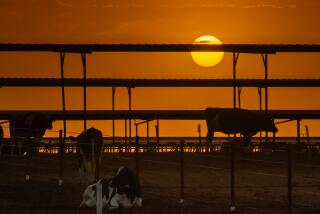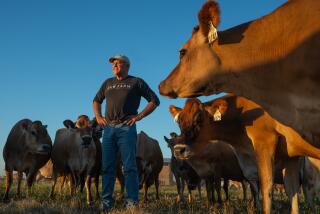Japan Suspects First ‘Mad Cow’ Case
- Share via
TOKYO — Japan’s government announced Monday that it has found the country’s--and Asia’s--first suspected case of “mad cow” disease and blamed imported feed as the likely cause.
Japanese health experts had previously asserted that the high standards of cleanliness at Japanese cattle ranches would keep the country free of the brain-wasting disease, which has ravaged herds in Britain and elsewhere in Europe and is believed to be linked to a fatal human disease.
But officials were alarmed last month when a cow in Shiroi in Chiba prefecture mysteriously lost the ability to stand. The animal was slaughtered, and tests of its brain showed signs of the illness, according to a statement issued Monday by the Ministry of Agriculture.
“We must now ask ourselves if our previous way of thinking was wrong, if there were factors we hadn’t foreseen,” said Kiyoshi Onodera, deputy division chief at the ministry’s animal health division.
The government said more tests were necessary to determine conclusively whether the cow was infected with the disease.
Milk produced by the 5-year-old Holstein had already been sold before the slaughter, but scientists believe milk is unlikely to spread the disease. Norio Tsuruoka, an official with Chiba prefecture’s stockbreeding sanitation section, said about 4,160 gallons of milk from the suspect cow were sold.
He said it was not immediately clear where the milk had been marketed. However, Chiba is a main supplier of agricultural products to Tokyo, just to the west.
About 30 other cows were being raised at the same farm as the suspect cow, and there are about 100 head of cattle in Shiroi in total--but the other animals are not thought to be harboring the disease, Tsuruoka said. Many have been quarantined, but officials have not yet decided whether to slaughter them.
Mad cow disease, or bovine spongiform encephalopathy, is believed to be spread by recycling meat and bones from infected animals back into cattle feed. Mad cow disease is thought to cause a fatal brain-wasting disease in humans, variant Creutzfeldt-Jakob disease.
The suspect Holstein is believed to have been infected by feed that contained contaminated animal parts, said Katsuaki Sugiura, another official at the Ministry of Agriculture’s animal health division.
If confirmed, the case would be the first in Asia. World Health Organization officials said in December that they were concerned that BSE-infected animal feed may have been sold around the world.
Although most imported feed used in Japan comes from the United States, Canada and Australia--all of which are believed to be free of mad cow disease--some shipments were imported from European countries, including Denmark and Italy, before a ban on European feed took effect this year, Sugiura said.
More to Read
Sign up for Essential California
The most important California stories and recommendations in your inbox every morning.
You may occasionally receive promotional content from the Los Angeles Times.












